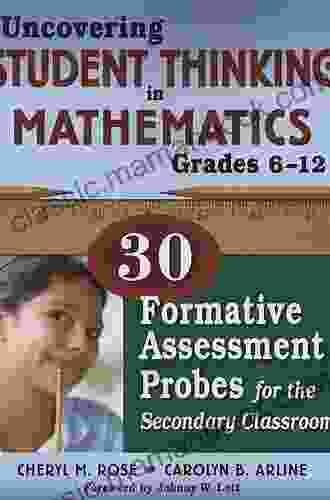Uncovering Student Thinking in Mathematics: Grades 1-2

Student thinking is a complex and dynamic process that is influenced by a variety of factors, including prior knowledge, experiences, and beliefs. In mathematics, student thinking is often revealed through their work on problems and tasks. By carefully analyzing student work, teachers can gain valuable insights into their students' understanding of mathematical concepts and their ability to apply mathematical skills. This information can then be used to inform instruction and to provide targeted support to students who are struggling.
4.4 out of 5
| Language | : | English |
| File size | : | 3293 KB |
| Text-to-Speech | : | Enabled |
| Screen Reader | : | Supported |
| Enhanced typesetting | : | Enabled |
| Word Wise | : | Enabled |
| Print length | : | 248 pages |
Assessment of Student Thinking
There are a variety of ways to assess student thinking in mathematics. Some of the most common methods include:
- Observations: Observing students as they work on problems and tasks can provide valuable insights into their thinking processes. Teachers can look for evidence of student understanding, such as the strategies they use to solve problems, the questions they ask, and the errors they make.
- Interviews: Interviewing students individually or in small groups can provide more in-depth information about their thinking. Teachers can ask students questions about their understanding of mathematical concepts, their problem-solving strategies, and their beliefs about mathematics.
- Written work: Student work on problems and tasks can provide evidence of their understanding of mathematical concepts and their ability to apply mathematical skills. Teachers can analyze student work to identify common errors, patterns of thinking, and areas where students need additional support.
Formative Assessment
Formative assessment is an essential tool for uncovering student thinking and informing instruction. Formative assessment is an ongoing process that occurs throughout the learning process. It involves collecting evidence of student learning and using that evidence to make decisions about instruction. Formative assessment can be used to identify students who are struggling, to provide targeted support, and to adjust instruction to meet the needs of all learners.
Differentiation
Differentiation is the process of tailoring instruction to meet the individual needs of students. Differentiation can be based on a variety of factors, including student readiness, interests, and learning styles. By differentiating instruction, teachers can ensure that all students have the opportunity to learn and succeed in mathematics.
Equity, Diversity, and Inclusion
Equity, diversity, and inclusion are essential components of effective mathematics instruction. Equity means that all students have access to the same opportunities and resources to learn mathematics. Diversity means that students come from a variety of backgrounds and experiences. Inclusion means that all students feel welcome and respected in the mathematics classroom. By creating an equitable, diverse, and inclusive classroom environment, teachers can help all students to reach their full potential in mathematics.
Uncovering student thinking in mathematics is essential for effective instruction. By carefully assessing student work, observing students as they work, and interviewing students about their thinking, teachers can gain valuable insights into their students' understanding of mathematical concepts and their ability to apply mathematical skills. This information can then be used to inform instruction, to provide targeted support to students who are struggling, and to create an equitable, diverse, and inclusive classroom environment where all students can learn and succeed.
4.4 out of 5
| Language | : | English |
| File size | : | 3293 KB |
| Text-to-Speech | : | Enabled |
| Screen Reader | : | Supported |
| Enhanced typesetting | : | Enabled |
| Word Wise | : | Enabled |
| Print length | : | 248 pages |
Do you want to contribute by writing guest posts on this blog?
Please contact us and send us a resume of previous articles that you have written.
 Top Book
Top Book Novel
Novel Fiction
Fiction Nonfiction
Nonfiction Literature
Literature Paperback
Paperback Hardcover
Hardcover E-book
E-book Audiobook
Audiobook Bestseller
Bestseller Classic
Classic Mystery
Mystery Thriller
Thriller Romance
Romance Fantasy
Fantasy Science Fiction
Science Fiction Biography
Biography Memoir
Memoir Autobiography
Autobiography Poetry
Poetry Drama
Drama Historical Fiction
Historical Fiction Self-help
Self-help Young Adult
Young Adult Childrens Books
Childrens Books Graphic Novel
Graphic Novel Anthology
Anthology Series
Series Encyclopedia
Encyclopedia Reference
Reference Guidebook
Guidebook Textbook
Textbook Workbook
Workbook Journal
Journal Diary
Diary Manuscript
Manuscript Folio
Folio Pulp Fiction
Pulp Fiction Short Stories
Short Stories Fairy Tales
Fairy Tales Fables
Fables Mythology
Mythology Philosophy
Philosophy Religion
Religion Spirituality
Spirituality Essays
Essays Critique
Critique Commentary
Commentary Glossary
Glossary Bibliography
Bibliography Index
Index Table of Contents
Table of Contents Preface
Preface Introduction
Introduction Foreword
Foreword Afterword
Afterword Appendices
Appendices Annotations
Annotations Footnotes
Footnotes Epilogue
Epilogue Prologue
Prologue S Frances Robbins
S Frances Robbins J Todd Hawkins
J Todd Hawkins Jack Grimshaw
Jack Grimshaw Morris G Davies
Morris G Davies Brandon Roe
Brandon Roe Savannah Jezowski
Savannah Jezowski David Richardson
David Richardson James Villas
James Villas Soteira Press
Soteira Press Becky Thomas
Becky Thomas Barry Libert
Barry Libert Carline Crevecoeur
Carline Crevecoeur Shirley Raye Redmond
Shirley Raye Redmond Ron Marz
Ron Marz Daniel Peyton
Daniel Peyton Sunil Tulsiani
Sunil Tulsiani Anzhela Shaposhnyk
Anzhela Shaposhnyk Matthew Gumke
Matthew Gumke Janaka Stucky
Janaka Stucky Gayden Metcalfe
Gayden Metcalfe
Light bulbAdvertise smarter! Our strategic ad space ensures maximum exposure. Reserve your spot today!

 Cormac McCarthyThe Missing Link In Late Twentieth Century Italian Poetry: The Fairleigh...
Cormac McCarthyThe Missing Link In Late Twentieth Century Italian Poetry: The Fairleigh... Jaden CoxFollow ·19.6k
Jaden CoxFollow ·19.6k Galen PowellFollow ·7.3k
Galen PowellFollow ·7.3k Caleb CarterFollow ·18.9k
Caleb CarterFollow ·18.9k Devin RossFollow ·17.8k
Devin RossFollow ·17.8k Frank ButlerFollow ·7.4k
Frank ButlerFollow ·7.4k Jorge AmadoFollow ·4.3k
Jorge AmadoFollow ·4.3k Oliver FosterFollow ·13.7k
Oliver FosterFollow ·13.7k Chuck MitchellFollow ·4k
Chuck MitchellFollow ·4k
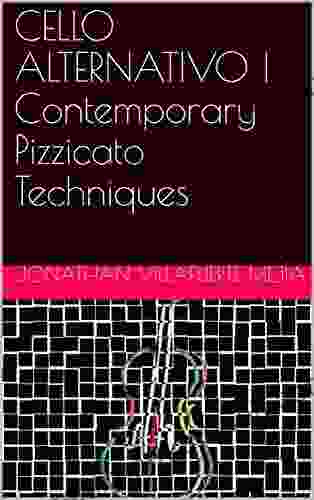
 Bryan Gray
Bryan GrayCello Alternativo: Exploring Contemporary Pizzicato...
: Embracing the Avant-Garde Within...
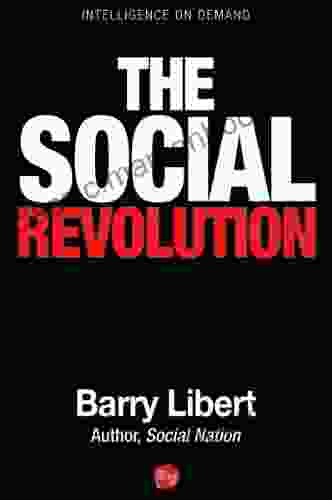
 Victor Hugo
Victor HugoThe Social Revolution: Barry Libert's Vision for a More...
In a world where...
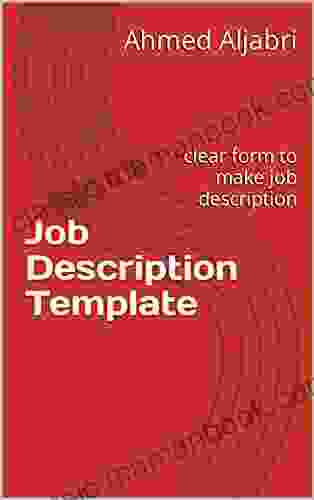
 Tony Carter
Tony CarterA Comprehensive Guide to Crafting Clear and Effective Job...
A job description is a critical tool...
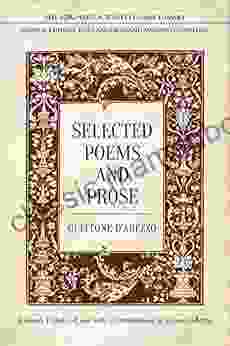
 Deacon Bell
Deacon BellSelected Poems And Prose Lorenzo Da Ponte Italian Library
Lorenzo Da Ponte, born...

 Francisco Cox
Francisco CoxWhat You Need To Know About Opportunity Cost: A...
Opportunity cost is a fundamental concept...
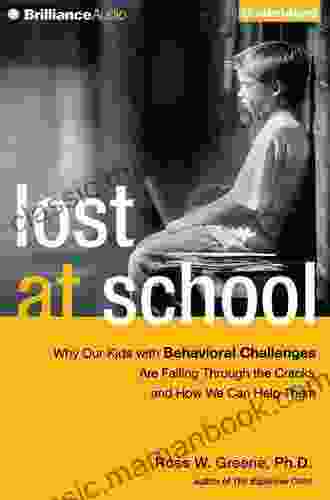
 Bill Grant
Bill GrantWhy Our Kids With Behavioral Challenges Are Falling...
Every year,...
4.4 out of 5
| Language | : | English |
| File size | : | 3293 KB |
| Text-to-Speech | : | Enabled |
| Screen Reader | : | Supported |
| Enhanced typesetting | : | Enabled |
| Word Wise | : | Enabled |
| Print length | : | 248 pages |


